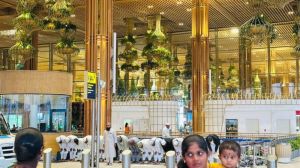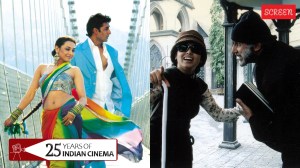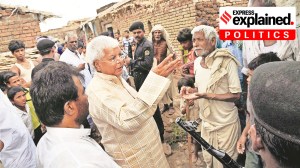Worry in Tripoli: No one knows future
The Gaddafi government gave journalists a tour of the wreckage of two missile warehouses at the Tripoli port.
DAVID D KIRKPATRICK
The Gaddafi government Tuesday gave journalists a tour of the wreckage of two missile warehouses at the Tripoli port in the first public display of significant damage to the capital from the American and European airstrikes.
Inside the still smouldering remains of the warehouses were four Russian-made surface-to-air missile launchers with Cyrillic writing on them,a row of what appeared to be missiles and several burned-out military vehicles. Scraps of shrapnel had been blown as far as 50 yards from a deep crater near the center of the warehouse. Libyan naval frigates in the harbor were left untouched by the blast.
Some military officers on the scene said the site was merely a training or refueling location,and asserted that several people had been wounded in the attack. But Capt. Abdul Baset Ali,a Libyan naval officer,said no one had been injured or killed because the Libyan government had expected the attack and evacuated.
Nobody was here because we knew this place may be targeted,so we went far away, he said. Asked what the future holds for Libya,he said: Nobody knows. We hope it will be good.
One military officer,asking for anonymity so he could speak openly,said that he respected the Western goal of establishing a no-fly zone to protect Libyan civilians,but that the broad scope of the attacks risked creating a backlash. This is not the way to shift out Gaddafi, he said.
Though the airstrikes do not appear to have led to any new uprising against Muammar Gaddafi here,there was evidence that they had had a significant psychological impact. On an organised stroll through the old city with Gaddafi government minders,several Tripoli residents approached foreign journalists to offer their disdain or impatience with the Gaddafi government. Sometimes they spoke within just a few yards of a government representative.
Offered the bromide that it was a beautiful country,one man replied in perfect English,It will be after we change the system.
Despite the governments many warnings that the population was boiling with anger at the West over the airstrikes,there appeared to be no hint of hard feelings. Most people,even those with nothing to sell,were as eager as ever to talk about America or Europe and welcome Western strangers.
Several pointed to the perennial demonstration in support of Gaddafi in the citys Green Square in the early afternoon a few dozen people were waving green scarves and flag and cautioned that it did not represent the real Libya. Some directed journalists to the rebellious neighborhoods of Tajura and Feshloom,to get a better sense of Libyans true feelings.
People are very afraid,honestly, one man said,explaining why most people still refused to talk. They killed a lot of people in Tripoli,including one of my relatives. You have to be careful. They are watching right now.
As the fourth night of airstrikes began about 8 pm,a news conference broadcast over state television showed a group of tribal leaders in Tripoli announcing plans for a peace march really a bus ride to Benghazi as an attempt to unify the country.
A reporter asked how they would resolve the philosophical differences between the Gaddafi governments embrace of its current system and the rebels calls for a constitutional democracy.
Our main purpose is to stop the bloodshed, the groups leader said,speaking through a government translator. After that,everything is up for dialogue.



- 01
- 02
- 03
- 04
- 05




























